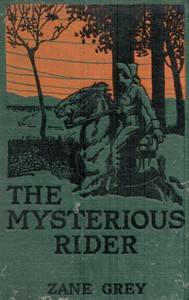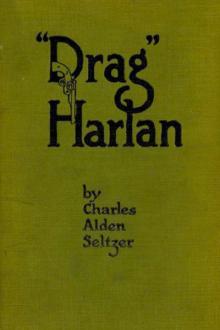The Day of the Beast, Zane Grey [read book txt] 📗

- Author: Zane Grey
Book online «The Day of the Beast, Zane Grey [read book txt] 📗». Author Zane Grey
"Then—it's just—monstrous," said Blair, heavily.
"That's all, Blair. Just monstrous. But we can't beat our spirits out against this wall. No one can understand us—how alone we are. Let's forget that—this wall—this thing called government. Shall we spend what time we have to live always in a thunderous atmosphere of mind—hating, pondering, bitter?"
"No. I'll make a compact with you," returned Blair, with flashing eyes. "Never to speak again of that—so long as we live!"
"Never to a living soul," rejoined Lane, with a ring in his voice.
They shook hands much the same as when they had met half an hour earlier.
"So!" exclaimed Blair, with a deep breath. "And now, Dare, tell me how you made out with Helen. You cut me short over the 'phone."
"Blair, that day coming into New York on the ship, you didn't put it half strong enough," replied Lane. Then he told Blair about the call he had made upon Helen, and what had transpired at her studio.
Blair did not voice the scorn that his eyes expressed. And, in fact, most of his talking was confined to asking questions. Lane found it easy enough to unburden himself, though he did not mention his calls on Mel Iden, or Colonel Pepper's disclosures.
"Well, I guess it's high time we were meandering up to the hall," said Blair, consulting his watch. "I'm curious about this Prom. Think we're in for a jolt. It's four years since I went to a Prom. Now, both of us, Dare, have a sister who'll be there, besides all our old friends.... And we're not dancing! But I want to look on. They've got an out-of-town orchestra coming—a jazz orchestra. There'll probably be a hot time in the old town to-night."
"Lorna did not tell me," replied Lane, as they got up to go. "But I suppose she'd rather I didn't know. We've clashed a good deal lately."
"Dare, I hear lots of talk," said Blair. "Margaret is chummy with me, and some of her friends are always out at the house. I hear Dick Swann is rushing Lorna. Think he's doing it on the q-t."
"I know he is, Blair, but I can't catch them together," returned Lane. "Lorna is working now. Swann got her the job."
"Looks bad to me," replied Blair, soberly. "Swann is cutting a swath. I hear his old man is sore on him.... I'd take Lorna out of that office quick."
"Maybe you would," declared Lane, grimly. "For all the influence or power I have over Lorna I might as well not exist."
They walked silently along the street for a little while. Lane had to accommodate his step to the slower movement of his crippled friend. Blair's crutch tapped over the stone pavement and clicked over the curbs. They crossed the railroad tracks and turned off the main street to go down a couple of blocks.
"Shades of the past!" exclaimed Blair, as they reached a big brick building, well-lighted in front by a sizzling electric lamp. The night was rather warm and clouds of insects were wheeling round the light. "The moths and the flame!" added Blair, satirically. "Well, Dare, old bunkie, brace up and we'll go over the top. This ought to be fun for us."
"I don't see it," replied Lane. "I'll be about as welcome as a bull in a china shop."
"Oh, I didn't mean any one would throw fits over us," responded Blair. "But we ought to get some fun out of the fact."
"What fact?" queried Lane, puzzled.
"Rather far-fetched, maybe. But I'll get a kick out of looking on—watching these swell slackers with the girls we fought for."
"Wonder why they didn't give the dance at the armory, where they'd not have to climb stairs, and have more room?" queried Lane, as they went in under the big light.
"Dare, you're far back in the past," said Blair, sardonically. "The armory is on the ground floor—one big hall—open, you know. The Assembly Hall is a regular maze for rooms and stairways."
Blair labored up the stairway with Lane's help. At last they reached the floor from which had blared the strains of jazz. Wide doors were open, through which Lane caught the flash of many colors. Blair produced his tickets at the door. There did not appear to be any one to take them.
Lane experienced an indefinable thrill at the scene. The air seemed to reek with a mixed perfume and cigarette smoke—to resound with high-keyed youthful laughter, wild and sweet and vacant above the strange, discordant music. Then the flashing, changing, whirling colors of the dancers struck Lane as oriental, erotic, bizarre—gorgeous golds and greens and reds striped by the conventional black. Suddenly the blare ceased, and the shrill, trilling laughter had dominance. The rapid circling of forms came to a sudden stop, and the dancers streamed in all directions over the floor.
"Dare, they've called time," said Blair. "Let's get inside the ropes so we can see better."
The hall was not large, but it was long, and shaped like a letter L with pillars running down the center. Countless threads of many-colored strings of paper had been stretched from pillars to walls, hanging down almost within reach of the dancers. Flags and gay bunting helped in the riotous effect of decoration. The black-faced orchestra held forth on a raised platform at the point where the hall looked two ways. Recesses, alcoves and open doors to other rooms, which the young couples were piling over each other to reach, gave Lane some inkling of what Blair had hinted.
"Now we're out in the limelight," announced Blair, as he halted. "Let's stand here and run the gauntlet until the next dance—then we can find seats."
Almost at once a stream of gay couples enveloped them in passing. Bright, flashing, vivid faces and bare shoulders, arms and breasts appeared above the short bodices of the girls. Few of them were gowned in white. The colors seemed too garish for anything but musical comedy. But the freshness, the vividness of these girls seemed exhilarating. The murmur, the merriment touched a forgotten chord in Lane's heart. For a moment it seemed sweet to be there, once more in a gathering where pleasure was the pursuit. It breathed of what seemed long ago, in a past that was infinitely more precious to remember because he had no future of hope or of ambition or dream. Something had happened to him that now made the sensations of the moment stingingly bitter-sweet. The freshness and fragrance, the color and excitement, the beauty and gayety were not for him. Youth was dead. He could never enter the lists with these young men, many no younger than he, for the favor and smile of a girl. Resignation had not been so difficult in the spiritual moment of realization and resolve, but to be presented with one concrete and stunning actuality after another, each





Comments (0)